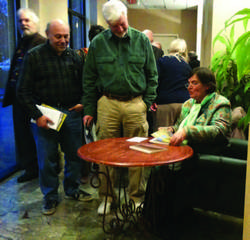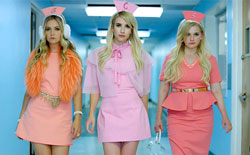Romanian poet Liliana Ursa shared some of her work last Thursday at Samuel Magill Commons as part of the Visiting Writers Series, which is connected to the University’s Center for the Arts.
On the University’s Visiting Writers Series webpage, Michael Thomas, Director of the program and Assistant Dean of the School of Humanities and Social Sciences, said in a video recording, “What we’re doing is following an ancient tradition of the oral performance of literature, and whether we know it or not, we have a real hunger for that kind of live oral performance of literature. And I love the way that the Visiting Writers brings people together like that.”
The reading began with an introduction by Thomas, who acknowledged the fact that Ursa wasn’t originally considered to be part of this year’s engagement, since she lived in Romania, until it was known she’d be touring the United States. “When we had an opportunity, we took advantage of it,” Thomas said.
After Ursa was introduced, the eager audience gave a generous applause. She took to the podium, grateful for the response, and thanked Thomas for his introduction. Ursa started with a story about a friend pleading her to come to America, since the friend suggested, “America is your writing desk.” She finally took the journey from Romania, and was immediately moved by the weather in New Jersey. “And of course,” Ursa said, “I started writing a poem. And then a second arrived.”
Ursa also explained that some foreign language poets didn’t hold the same values of translating their work to other languages like she did, or liked “covering a rose with a blanket” and attempting to smell it through the blanket. Ursa said she tries to cover the rose with “a thin veil” so the poem doesn’t lose its original meaning.
The first poem Ursa read was titled “Unforgetting,” in Romanian, and was one of the first poems that she had written. Her poem was about absence and desire to write poetry. While some of the audience couldn’t understand the poem in her native language, the emotion in her voice was enough to feel the sadness and “absence” of the poem.
Linda Jenkins, of Wall Township, said she had been an admirer of Ursa’s for a few years and was thrilled to hear she’d be visiting the University.
“It’s wonderful to hear a poet like Liliana read her poetry aloud as opposed to just reading her poetry at your home,” Jenkins said.
“Her voice offered so much depth to her already emotional and moving poetry.”
Later, Ursa explained that her name came from her father. He wanted a boy but instead had her so she chose to honor him by using the name. But she also said Ursa meant “bear” in Romanian, “a powerful name.”
Then she read a poem about her experience of meeting a live bear that two men brought to her home in Romania, and the jolt of life she felt after touching the animal.
Ursa explained all her poems offer stories and insight into her writing. Each poem is so memorable to the point of where it was written and her overall feelings. With her poem “City Lights” she described the café she was sitting in, her mood, and what inspired her to write the poem about a “city tamed once and a while by the poet.”
“I loved Liliana’s selection of her poems since almost all of them addressed a situation or a landscape in which the poet was moved to write in that very moment,” said Thomas. “Liliana Ursu often finds moments of celebration or sorrow in which she begins composing, and her poems reveal that hunger, that feverish urge to make sense of the unsayable, which is a poet’s job.”
While Ursa’s poems match perfectly with stories, describing the minute details in experiences, she also has an elegant way of reading her poetry. There’s a careful accentuation of each word that holds a valuable meaning when strung together with some phrases said in a soft whisper as they delicately slip from her tongue.
Street,” about a street Ursa lives on with many friends, her voice rose with sweetness as she said, “There we forget to grow old.”
Shelby Whitebread, a senior in marine biology, attended the event for Thomas’s poetry class, Confessional Poets, and found the readings “moving” and “spiritual.” She also said she wants to go to more events at the University.
“It’s great that we have so many different events that are walking distance from our dorms,” said Whitebread. “It’s really awesome and eye open ing thing that many people can enjoy.”
PHOTO COURTESY of Dan Ste. Marie




